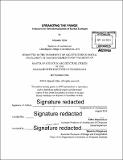| dc.contributor.advisor | Miho Mazereeuw. | en_US |
| dc.contributor.author | Ojha, Mayank | en_US |
| dc.contributor.other | Massachusetts Institute of Technology. Department of Architecture. | en_US |
| dc.date.accessioned | 2017-03-10T15:04:53Z | |
| dc.date.available | 2017-03-10T15:04:53Z | |
| dc.date.copyright | 2016 | en_US |
| dc.date.issued | 2016 | en_US |
| dc.identifier.uri | http://hdl.handle.net/1721.1/107314 | |
| dc.description | Thesis: S.M., Massachusetts Institute of Technology, Department of Architecture, 2016. | en_US |
| dc.description | Cataloged from PDF version of thesis. Page 132 blank. | en_US |
| dc.description | Includes bibliographical references (pages 127-131). | en_US |
| dc.description.abstract | 25 years after India initiated its landmark reforms for economic liberalization, it continues to be challenged in balancing rapid economic growth, inclusive development and environmental sustainability. As the world seeks ways to curtail emissions ahead of a critical juncture in climate change, India's choice - representing 17.5% of humanity, of a growth-propelled, market-led development pathway has the potential to offset global efforts with irreversible consequences. Kalinganagar, located in the resource rich northeastern peninsular belt, is a paradigmatic case of neoliberal industrial urbanism. Here, the demand for commodities and resources from a burgeoning, globalized, aspiring middle class subordinates communities depending on natural environments within their localities for livelihood security and most material needs. Habitats of its indigenous populations, once marginalized rural hinterlands, are now sites of multilateral contestations as neoliberal policies and governance enable their transformation into geographies of extraction. The ensuing severance of linkages between communities and their landscape results in the loss of a critical interest group in the preservation of natural ecologies. In an impasse between fallacious optimism and cynical pessimism, the thesis explores the synergetic prospects of grassroots governance and liberal capitalism, for a rurban model of regional development. Keywords: neoliberalism, deterritorialization, fringe, armatures, industrial urbanism, rurbanization, new village | en_US |
| dc.description.statementofresponsibility | by Mayank Ojha. | en_US |
| dc.format.extent | 132 pages | en_US |
| dc.language.iso | eng | en_US |
| dc.publisher | Massachusetts Institute of Technology | en_US |
| dc.rights | MIT theses are protected by copyright. They may be viewed, downloaded, or printed from this source but further reproduction or distribution in any format is prohibited without written permission. | en_US |
| dc.rights.uri | http://dspace.mit.edu/handle/1721.1/7582 | en_US |
| dc.subject | Architecture. | en_US |
| dc.title | Urbanizing the fringe : armatures for reterritorialization of rurban ecologies | en_US |
| dc.type | Thesis | en_US |
| dc.description.degree | S.M. | en_US |
| dc.contributor.department | Massachusetts Institute of Technology. Department of Architecture | |
| dc.identifier.oclc | 972736863 | en_US |
